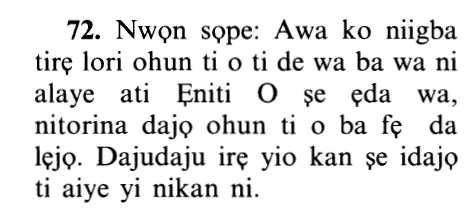20vs72
Select any filter and click on Go! to see results
قَالُوا لَن نُّؤْثِرَكَ عَلَى مَا جَاءنَا مِنَ الْبَيِّنَاتِ وَالَّذِي فَطَرَنَا فَاقْضِ مَا أَنتَ قَاضٍ إِنَّمَا تَقْضِي هَذِهِ الْحَيَاةَ الدُّنْيَا
Qaloo lan nuthiraka AAala ma jaana mina albayyinati waallathee fatarana faiqdi ma anta qadin innama taqdee hathihi alhayata alddunya
Index Terms
Click to play
Yoruba Translation

Hausa Translation
Suka ce: "Bã zã mu fĩfĩta ka ba faufau a kan abin da ya zo mana na hujjõji. Munã rantsuwa da wanda Ya ƙãga halittarmu sai ka hukunta abin da kake mai hukuntãwa, ai kanã ƙãre wannan rãyuwar dũniya kawai ne."
Asbabu n-Nuzuul (Occasions of Revelation)
قَالُوا لَن نُّؤْثِرَكَ عَلَى مَا جَاءنَا مِنَ الْبَيِّنَاتِ ...
They said: "We prefer you not over what have come to us of the clear signs...''
meaning, "We do not chose you over the guidance and conviction that we have received. ''
... وَالَّذِي فَطَرَنَا ...
and to Him (Allah) Who created us.
It could be that they were swearing, "By He Who has created us.''
It also could be connected in meaning to the clear signs mentioned before it. In this case it would mean,
"We do not prefer you over our Originator and Creator, Who produced us from a beginning that was nothing. He created us from clay (or mud). Therefore, He alone deserves worship and humility and you do not (Fir`awn)!''
... فَاقْضِ مَا أَنتَ قَاضٍ ...
So decree whatever you desire to decree,
"Do whatever you wish and whatever your hands are able to achieve.''
... إِنَّمَا تَقْضِي هَذِهِ الْحَيَاةَ الدُّنْيَا ﴿٧٢﴾
for you can only decree (regarding) this life of the world.
meaning, "You only have power in this world and it is a world that will come to an end. Verily, we are hoping in the eternal abode.''
و " قالوا لن نؤثرك على ما جاءنا من البينات " أي لن نختارك على ما حصل لنا من الهدى واليقين " والذي فطرنا " يحتمل أن يكون قسما ويحتمل أن يكون معطوفا على البينات يعنون لا نختارك على فاطرنا وخالقنا الذي أنشأنا من العدم المبتدي خلقنا من الطين فهو المستحق للعبادة والخضوع لا أنت فاقض ما أنت قاض أي فافعل ما شئت وما وصلت إليه يدك إنما تقضي هذه الحياة الدنيا أي إنما لك تسلط في هذه الدار وهي دار الزوال ونحن قد رغبنا في دار القرار .
"قالوا لن نؤثرك" نختارك "على ما جاءنا من البينات" الدالة على صدق موسى "والذي فطرنا" خلقنا قسم أو عطف على ما "فاقض ما أنت قاض" أي اصنع ما قلته "إنما تقضي هذه الحياة الدنيا" النصب على الاتساع أي فيها وتجزى عليه في الآخرة
يعني السحرة
I'raab - grammatical analysis of the Qur'an
«قالُوا» الجملة استئنافية «لَنْ» ناصبة «نُؤْثِرَكَ» مضارع منصوب وفاعله مستتر تقديره نحن والكاف مفعول به والجملة في محل نصب مقول القول «عَلى » حرف جر «ما» اسم موصول متعلقان بنؤثرك «جاءَنا» فعل ماض فاعله مستتر ونا مفعول به والجملة لا محل لها لأنها صلة «مِنَ الْبَيِّناتِ» متعلقان بمحذوف حال «وَالَّذِي» الواو حرف جر وقسم واسم الموصول في محل جر متعلقان بفعل اقسم المحذوف «فَطَرَنا» فعل ماض فاعله مستتر ونا مفعول به والجملة لا محل لها لأنها صلة موصول «فَاقْضِ» الفاء هي الفصيحة واقض أمر مبني على حذف حرف العلة وفاعله مستتر «ما» اسم موصول مفعول به «أَنْتَ» مبتدأ «قاضٍ» خبر مرفوع بالضمة المقدرة على الياء المحذوفة لأنه اسم منقوص والجملة صلة لا محل لها «إِنَّما» كافة ومكفوفة «تَقْضِي» مضارع فاعله مستتر «هذِهِ» اسم إشارة مفعول به «الْحَياةَ» بدل من اسم الإشارة «الدُّنْيا» صفة والجملة لا محل لها لأنها تعليلية
